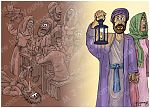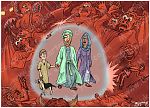Bible Cartoon: <-- 1 Thessalonians : 2 Thessalonians -->
Click on Add to cart button below shopping cart.
Purchased Bible Cartoons do not have watermarks. Links to Cartoons provided on email once purchase is completed.2 Thessalonians
Book type: Letter (Epistle)
Author: Apostle Paul
No. of chapters: 3
Key character(s): God, Jesus, Paul, Timothy, Silas [1]
Brief description: 2 Thessalonians – The demands of church teaching.
01) Salvation (1:1-2)
02) Church leaders pray for the church (1:3-12)
03) Christ’s return will defeat Satanic forces (2:1-12)
04) Election leads to thanksgiving (2:13-17)
05) God is faithful (3:1-5)
06) God disciplines his people (3:6-15)
07) Concluding greetings (3:16-18)
Paul’s second letter to the church in Thessalonica.
Theological conclusions.
01) The greatness of God.
02) The wonder of salvation in Christ.
03) The second coming.
04) The importance of life & work each day.
[Source: NIV Disciple’s Study Bible]
Themes in 2 Thessalonians:
Persevere Through Persecution – Like Christ, believers are called to suffer for the sake of the gospel. Our heavenly Father rewards our faithfulness and he causes us to grow stronger as we stand firm through difficult trials.
Our Responsibility in Light of His Return – Living in light of Christ’s soon return should never bring about idleness. On the contrary, we ought to stay busy with the work of the Lord as we see the day approaching.
Consistent Persistence – Following Christ requires commitment, courage and faithfulness. Giving up—throwing in the towel—is never an option. God rewards our patient endurance.
Certainly we are much closer now to the day of the Lord’s return than when this epistle was written. The book of 2 Thessalonians is a reminder and an encouragement for us to remain faithful even when trials and persecutions come. Like the early believers, we can live in readiness, watching and waiting for Christ’s return while staying busy with kingdom work.
[Source:http://christianity.about.com/od/newtestamentbooks/fl/2-Thessalonians.htm]
Key Verses:
2 Thessalonians 1:11 (NLT)
So we keep on praying for you, asking our God to enable you to live a life worthy of his call. May he give you the power to accomplish all the good things your faith prompts you to do.
2 Thessalonians 2:3 (NLT)
Don’t be fooled by what they say. For that day will not come until there is a great rebellion against God and the man of lawlessness is revealed—the one who brings destruction.
2 Thessalonians 3:5 (NLT)
May the Lord lead your hearts into a full understanding and expression of the love of God and the patient endurance that comes from Christ.
[1]
Fuller list of major characters in 2 Thessalonians:
| Name | Notes |
| Jesus | ”Saviour”. Christ means “the Anointed One”. (aka Jesus of Nazareth, The Christ, The Messiah, Son of man, Son of God). The central figure of the New Testament, whose life, death, and resurrection are chronicled in the 4 Gospel books. |
| Paul | (aka Saul, “Asked for” Hebrew.) Native of Tarsus, the capital of Cilicia, a Roman province in the south-east of Asia Minor. Jew with Roman citizenship; Pharisee; persecutor of the early Christian church. Converted from Judaism to Christianity after encounter with resurrected Jesus on the road to Damascus (Acts 9:1-30). Thereafter called an apostle (Ro 1:1, 1Co 1:1, 2Co 1:1, Gal 1:1, Eph 1:, Col 1:1, 1Ti 1:1, 2Ti 1:1, Tit 1:1). Author of at least 13 of the 27 books of the New Testament: Romans, Phillipians, 1 & 2 Timothy, 1 & 2 Corinthians, Colossians, Titus, 1 & 2 Thessalonians, Philemon, Galatians, Ephesians. |
| Timothy | Τιμόθεος, Timótheos. Mother was a Jewess convert to Christianity, his father was Greek (Acts 16:1). Resident, and probable native of Lystra a city of Lycaonia. Apostle Paul’s companion and fellow-laborer, one of Paul’s own converts (1 Corinthians 4:17). (Acts 17:14; Acts 18:5; Acts 19:22; Acts 20:4; Romans 16:21; 1 Cor. 4:17; 1 Cor. 16:10; 2 Cor. 1:1, 19; Phil. 1:1; Phil. 2:19; Col. 1:1; 1 Thes. 1:1; 1 Thes. 3:2, 6; 2 Thes. 1:1; 1 Tim. 1:2, 18; 1 Tim. 6:20; 2 Tim. 1:2; Philemon 1:1; Hebrews 13:23) |
| Silas | Σίλας, Sílas, probably contraction for Σιλουανός, Silouanós; the Hebrew equivalents suggested are שָׁלִישׁ, shālīsh, “Tertius,” or שֶׁלַח, shelaḥ (Genesis 10:24) or שָׁאוּל, shāʾūl = “asked”. Roman citizen (Acts 16:37) who accompanied the Apostle Paul on most of his 2nd missionary journey (Acts 15-18). Along with Judas (called Barsabbas), Silas was described as “men who were leaders among the brothers” (Acts 15:22). The Silas of Acts is generally identified with the Silvaus of the Epistles (2 Corinthians 1:19, 1 & 2 Thessalonians 1:1, Peter refers to him as “a faithful brother” in 1 Peter 5:12). |





